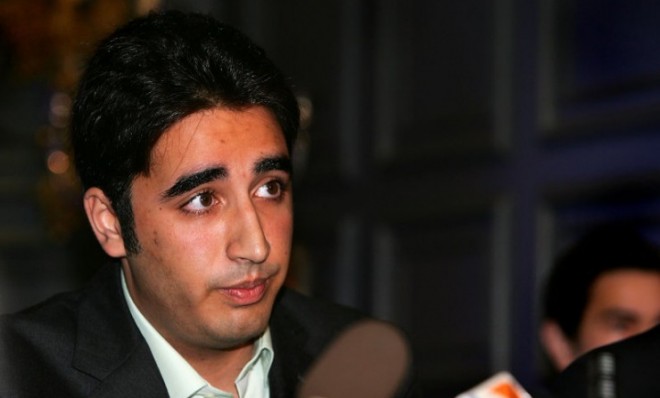Can Benazir Bhutto's son save Pakistan's democracy?
The 24-year-old scion of the country's most famous political dynasty says he won't back down to terrorists or dictators


A free daily email with the biggest news stories of the day – and the best features from TheWeek.com
You are now subscribed
Your newsletter sign-up was successful
This week, Bilawal Bhutto Zardari, the 24-year-old son of former Prime Minister Benazir Bhutto, launched his political career with an impassioned speech on the five-year anniversary of his mother's assassination. "With Benazir Bhutto as my witness," he declaimed, "I promise you that the [Pakistan People's Party] will never fear terrorists or bow to dictators." He was eagerly hailed by members of the PPP as the future of Pakistan, which has been wracked for several years by an Islamist insurgency and anemic economic growth. "Bilawal will lead the caravan of the nation and the democracy," said Prime Minister Raja Pervez Ashraf, a PPP member.
Bilawal, who recently completed his studies at Oxford, is still too young to run for office, but he is expected to be the public face of the PPP as it seeks to hold onto power in national elections next year. In a region where political dynasties are the norm, it's unsurprising that the party faithful would rally to Bilawal. He is not only the son of Benazir, but the grandson of Zulfikar Ali Bhutto, a former prime minister who founded the PPP. The elder Bhutto was ousted in a military coup, and was eventually executed by the regime of Muhammad Zia-ul-Haq in 1979. That is, in a nutshell, the story of Pakistani politics, with the nation swinging between military and democratic rule over several decades. In the wake of her father's assassination, Benazir built a global reputation as a champion of democracy, and after Zia's death, served two terms as prime minister in the 1980s and 1990s. She also played a role in the ouster of Pakistan's most recent military dictator, Pervez Musharraf, galvanizing public support for a return to democratic rule just before her death in 2007.
For all Benazir's faults, this is part of the political legacy that Bilawal has inherited. In addition, the Bhutto family is seen as a champion of secularism in Pakistan, which is struggling to tame the influence of Islamic extremist groups, including the Taliban. While the country's major cities are currently enjoying a respite from the spectacular terrorist attacks that were occurring regularly only a few years ago, Islamic militants are suspected to have recently waged violent campaigns against minority Shiites, polio vaccination workers, police officers, and, most notoriously, Malala Yousafzai, the 15-year-old girl who was nearly killed for calling for more education opportunities for women. "How long will you go on killing innocent people?" Bilawal demanded at his coming-out rally. "If one Malala will be killed, thousands will replace her. One Benazir was killed; thousands have replaced her."
The Week
Escape your echo chamber. Get the facts behind the news, plus analysis from multiple perspectives.

Sign up for The Week's Free Newsletters
From our morning news briefing to a weekly Good News Newsletter, get the best of The Week delivered directly to your inbox.
From our morning news briefing to a weekly Good News Newsletter, get the best of The Week delivered directly to your inbox.
The current government — nominally led by Asif Ali Zardari, Benazir's widower and Bilawal's father — is seemingly paralyzed in the face of these challenges. The military, which has long been suspected of shielding Pakistan's terrorist groups, essentially dictates Pakistan's national-security policy. Politicians are scared to confront the cancer of extremism for a variety of reasons, the most understandable of which is that it would literally put their lives at risk. (Just last year, the governor of Punjab, the country's largest province, was killed for challenging Pakistan's anti-blasphemy laws; his assassin was greeted with a shower of rose petals when he arrived at court.) There is no vision of secular, pluralistic democracy that the public can support, no single symbol around which Pakistan's "silent majority" of liberals and moderates can coalesce. Therein lies the hope for the heir of the Bhutto dynasty.
Can Bilawal live up to such high expectations? Some analysts say Bilawal, who was largely raised abroad, may struggle to make a strong connection with the public. (His less-than-perfect Urdu accent at the rally, for example, was much analyzed.) Furthermore, it's possible that the Bhutto brand has lost some of its luster. "Doubts remain over Bhutto's appeal to new, younger, urbanized and often more religiously minded voters," says Jason Burke at The Guardian. The recent rise of Imran Khan, a former cricketer who has transformed himself into a religiously devout populist, would suggest that the PPP could struggle with that growing constituency.
There's also the share of his family's legacy that could turn out to be a millstone around Bilawal's neck: Corruption. Accusations of corruption helped bring down both Benazir's governments. Her widower, Asif Ali Zardari, continues to be dogged by the Supreme Court over corruption charges, one factor that has stymied the government's ability to address a host of pressing issues. And corruption is endemic in the political class, which has not only stifled economic growth, but caused widespread distrust of the government. For Bilawal to truly succeed, he would not only have to keep his hands clean — he may have to take on the corruption within his party, as well as within his own family.
A free daily email with the biggest news stories of the day – and the best features from TheWeek.com
Ryu Spaeth is deputy editor at TheWeek.com. Follow him on Twitter.